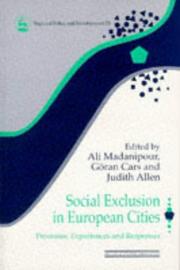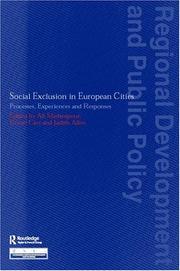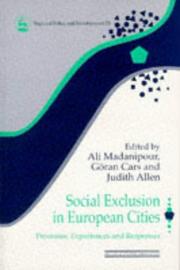| Listing 1 - 9 of 9 |
Sort by
|

Abstract | Keywords | Export | Availability | Bookmark
 Loading...
Loading...Choose an application
- Reference Manager
- EndNote
- RefWorks (Direct export to RefWorks)
Community development, Urban --- Neighborhoods --- Planned communities --- Urban policy --- Urban renewal --- Geografie --- Evaluation. --- Government policy --- Sociale en economische geografie --- Planning.

ISBN: 1853026093 Year: 1998 Volume: 23 Publisher: London Jessica Kingsley Publishers/Regional Studies Association
Abstract | Keywords | Export | Availability | Bookmark
 Loading...
Loading...Choose an application
- Reference Manager
- EndNote
- RefWorks (Direct export to RefWorks)
Cities and towns --- -Marginality, Social --- -Sociology, Urban --- -Urban policy --- -People with social disabilities --- -#SBIB:316.8H15 --- #SBIB:316.334.5U20 --- #SBIB:HIVA --- Culturally deprived people --- Culturally disadvantaged people --- Disadvantaged people, Culturally --- Disadvantaged people, Socially --- People with cultural disabilities --- Socially disadvantaged people --- Socially handicapped --- Underprivileged people --- People with disabilities --- Marginality, Social --- Cities and state --- Urban problems --- City and town life --- Economic policy --- Social policy --- Sociology, Urban --- City planning --- Urban renewal --- Urban sociology --- Exclusion, Social --- Marginal peoples --- Social exclusion --- Social marginality --- Assimilation (Sociology) --- Culture conflict --- Social isolation --- Sociology --- People with social disabilities --- Global cities --- Municipalities --- Towns --- Urban areas --- Urban systems --- Human settlements --- Welzijns- en sociale problemen: sociale ongelijkheid en armoede --- Sociologie van stad (buurt, wijk, community, stadsvernieuwing) --- Urban policy --- #SBIB:316.8H15 --- Europe --- Marginality [Social ] --- Poverty

ISBN: 0117023728 0117023744 Year: 2005 Publisher: London Routledge
Abstract | Keywords | Export | Availability | Bookmark
 Loading...
Loading...Choose an application
- Reference Manager
- EndNote
- RefWorks (Direct export to RefWorks)
Social stratification --- Social policy --- Sociology of environment --- Europe --- Urban ecology (Sociology). --- Geografie --- Sociale geografie --- Bewoning en leefgemeenschap.

ISBN: 9781853026096 Year: 1998 Publisher: London Kingsley
Abstract | Keywords | Export | Availability | Bookmark
 Loading...
Loading...Choose an application
- Reference Manager
- EndNote
- RefWorks (Direct export to RefWorks)
Article
Abstract | Keywords | Export | Availability | Bookmark
 Loading...
Loading...Choose an application
- Reference Manager
- EndNote
- RefWorks (Direct export to RefWorks)
Digital
ISBN: 9781783743056 9781783743063 Year: 2017 Publisher: Cambridge Open Book Publishers
Abstract | Keywords | Export | Availability | Bookmark
 Loading...
Loading...Choose an application
- Reference Manager
- EndNote
- RefWorks (Direct export to RefWorks)
What can we learn about the development of public interaction in e-democracy from a drama delivered by mobile headphones to an audience standing around a shopping center in a Stockholm suburb? In democratic societies there is widespread acknowledgment of the need to incorporate citizens’ input in decision-making processes in more or less structured ways. But participatory decision making is balancing on the borders of inclusion, structure, precision and accuracy. To simply enable more participation will not yield enhanced democracy, and there is a clear need for more elaborated elicitation and decision analytical tools. This rigorous and thought-provoking volume draws on a stimulating variety of international case studies, from flood risk management in the Red River Delta of Vietnam, to the consideration of alternatives to gold mining in Roșia Montană in Transylvania, to the application of multi-criteria decision analysis in evaluating the impact of e-learning opportunities at Uganda's Makerere University. Editors Love Ekenberg (senior research scholar, International Institute for Applied Systems Analysis [IIASA], Laxenburg, professor of Computer and Systems Sciences, Stockholm University), Karin Hansson (artist and research fellow, Department of Computer and Systems Sciences, Stockholm University), Mats Danielson (vice president and professor of Computer and Systems Sciences, Stockholm University, affiliate researcher, IIASA) and Göran Cars (professor of Societal Planning and Environment, Royal Institute of Technology, Stockholm) draw innovative collaborations between mathematics, social science, and the arts. They develop new problem formulations and solutions, with the aim of carrying decisions from agenda setting and problem awareness through to feasible courses of action by setting objectives, alternative generation, consequence assessments, and trade-off clarifications. As a result, this book is important new reading for decision makers in government, public administration and urban planning, as well as students and researchers in the fields of participatory democracy, urban planning, social policy, communication design, participatory art, decision theory, risk analysis and computer and systems sciences.
Book

Year: 2017 Publisher: Open Book Publishers
Abstract | Keywords | Export | Availability | Bookmark
 Loading...
Loading...Choose an application
- Reference Manager
- EndNote
- RefWorks (Direct export to RefWorks)
"What can we learn about the development of public interaction in e-democracy from a drama delivered by mobile headphones to an audience standing around a shopping center in a Stockholm suburb? In democratic societies there is widespread acknowledgment of the need to incorporate citizens’ input in decision-making processes in more or less structured ways. But participatory decision making is balancing on the borders of inclusion, structure, precision and accuracy. To simply enable more participation will not yield enhanced democracy, and there is a clear need for more elaborated elicitation and decision analytical tools.This rigorous and thought-provoking volume draws on a stimulating variety of international case studies, from flood risk management in the Red River Delta of Vietnam, to the consideration of alternatives to gold mining in Roșia Montană in Transylvania, to the application of multi-criteria decision analysis in evaluating the impact of e-learning opportunities at Uganda's Makerere University.Editors Love Ekenberg (senior research scholar, International Institute for Applied Systems Analysis [IIASA], Laxenburg, professor of Computer and Systems Sciences, Stockholm University), Karin Hansson (artist and research fellow, Department of Computer and Systems Sciences, Stockholm University), Mats Danielson (vice president and professor of Computer and Systems Sciences, Stockholm University, affiliate researcher, IIASA) and Göran Cars (professor of Societal Planning and Environment, Royal Institute of Technology, Stockholm) draw innovative collaborations between mathematics, social science, and the arts.They develop new problem formulations and solutions, with the aim of carrying decisions from agenda setting and problem awareness through to feasible courses of action by setting objectives, alternative generation, consequence assessments, and trade-off clarifications.As a result, this book is important new reading for decision makers in government, public administration and urban planning, as well as students and researchers in the fields of participatory democracy, urban planning, social policy, communication design, participatory art, decision theory, risk analysis and computer and systems sciences. "
Social issues & processes --- Political science & theory --- Political structures: democracy --- social policy --- urban planning --- participatory decision making --- communication design --- decision theory --- risk analysis and computer sciences --- e-democracy --- participatory art --- public interaction --- participatory democracy --- elicitation --- Multiple-criteria decision analysis
Book

Year: 2017 Publisher: Open Book Publishers
Abstract | Keywords | Export | Availability | Bookmark
 Loading...
Loading...Choose an application
- Reference Manager
- EndNote
- RefWorks (Direct export to RefWorks)
"What can we learn about the development of public interaction in e-democracy from a drama delivered by mobile headphones to an audience standing around a shopping center in a Stockholm suburb? In democratic societies there is widespread acknowledgment of the need to incorporate citizens’ input in decision-making processes in more or less structured ways. But participatory decision making is balancing on the borders of inclusion, structure, precision and accuracy. To simply enable more participation will not yield enhanced democracy, and there is a clear need for more elaborated elicitation and decision analytical tools.This rigorous and thought-provoking volume draws on a stimulating variety of international case studies, from flood risk management in the Red River Delta of Vietnam, to the consideration of alternatives to gold mining in Roșia Montană in Transylvania, to the application of multi-criteria decision analysis in evaluating the impact of e-learning opportunities at Uganda's Makerere University.Editors Love Ekenberg (senior research scholar, International Institute for Applied Systems Analysis [IIASA], Laxenburg, professor of Computer and Systems Sciences, Stockholm University), Karin Hansson (artist and research fellow, Department of Computer and Systems Sciences, Stockholm University), Mats Danielson (vice president and professor of Computer and Systems Sciences, Stockholm University, affiliate researcher, IIASA) and Göran Cars (professor of Societal Planning and Environment, Royal Institute of Technology, Stockholm) draw innovative collaborations between mathematics, social science, and the arts.They develop new problem formulations and solutions, with the aim of carrying decisions from agenda setting and problem awareness through to feasible courses of action by setting objectives, alternative generation, consequence assessments, and trade-off clarifications.As a result, this book is important new reading for decision makers in government, public administration and urban planning, as well as students and researchers in the fields of participatory democracy, urban planning, social policy, communication design, participatory art, decision theory, risk analysis and computer and systems sciences. "
social policy --- urban planning --- participatory decision making --- communication design --- decision theory --- risk analysis and computer sciences --- e-democracy --- participatory art --- public interaction --- participatory democracy --- elicitation --- Multiple-criteria decision analysis
Book

Year: 2017 Publisher: Open Book Publishers
Abstract | Keywords | Export | Availability | Bookmark
 Loading...
Loading...Choose an application
- Reference Manager
- EndNote
- RefWorks (Direct export to RefWorks)
"What can we learn about the development of public interaction in e-democracy from a drama delivered by mobile headphones to an audience standing around a shopping center in a Stockholm suburb? In democratic societies there is widespread acknowledgment of the need to incorporate citizens’ input in decision-making processes in more or less structured ways. But participatory decision making is balancing on the borders of inclusion, structure, precision and accuracy. To simply enable more participation will not yield enhanced democracy, and there is a clear need for more elaborated elicitation and decision analytical tools.This rigorous and thought-provoking volume draws on a stimulating variety of international case studies, from flood risk management in the Red River Delta of Vietnam, to the consideration of alternatives to gold mining in Roșia Montană in Transylvania, to the application of multi-criteria decision analysis in evaluating the impact of e-learning opportunities at Uganda's Makerere University.Editors Love Ekenberg (senior research scholar, International Institute for Applied Systems Analysis [IIASA], Laxenburg, professor of Computer and Systems Sciences, Stockholm University), Karin Hansson (artist and research fellow, Department of Computer and Systems Sciences, Stockholm University), Mats Danielson (vice president and professor of Computer and Systems Sciences, Stockholm University, affiliate researcher, IIASA) and Göran Cars (professor of Societal Planning and Environment, Royal Institute of Technology, Stockholm) draw innovative collaborations between mathematics, social science, and the arts.They develop new problem formulations and solutions, with the aim of carrying decisions from agenda setting and problem awareness through to feasible courses of action by setting objectives, alternative generation, consequence assessments, and trade-off clarifications.As a result, this book is important new reading for decision makers in government, public administration and urban planning, as well as students and researchers in the fields of participatory democracy, urban planning, social policy, communication design, participatory art, decision theory, risk analysis and computer and systems sciences. "
Social issues & processes --- Political science & theory --- Political structures: democracy --- social policy --- urban planning --- participatory decision making --- communication design --- decision theory --- risk analysis and computer sciences --- e-democracy --- participatory art --- public interaction --- participatory democracy --- elicitation --- Multiple-criteria decision analysis --- social policy --- urban planning --- participatory decision making --- communication design --- decision theory --- risk analysis and computer sciences --- e-democracy --- participatory art --- public interaction --- participatory democracy --- elicitation --- Multiple-criteria decision analysis
| Listing 1 - 9 of 9 |
Sort by
|

 Search
Search Feedback
Feedback About UniCat
About UniCat  Help
Help News
News